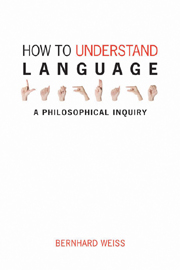Book contents
- Frontmatter
- Contents
- Preface
- 1 The puzzles of language
- 2 The starting-point for analysis
- 3 Analysing sentence-meaning
- 4 Analysing synonymy
- 5 Radical translation
- 6 The structure of a theory of meaning
- 7 Radical interpretation
- 8 Linguistic norms, communication and radical interpretation
- 9 Linguistic normativity
- 10 Radical or robust?
- 11 Language and community
- 12 Rules and privacy: the problem
- 13 Rules and privacy: the solution?
- 14 Truth-conditions versus use-conditions
- Notes
- Bibliography
- Index
5 - Radical translation
- Frontmatter
- Contents
- Preface
- 1 The puzzles of language
- 2 The starting-point for analysis
- 3 Analysing sentence-meaning
- 4 Analysing synonymy
- 5 Radical translation
- 6 The structure of a theory of meaning
- 7 Radical interpretation
- 8 Linguistic norms, communication and radical interpretation
- 9 Linguistic normativity
- 10 Radical or robust?
- 11 Language and community
- 12 Rules and privacy: the problem
- 13 Rules and privacy: the solution?
- 14 Truth-conditions versus use-conditions
- Notes
- Bibliography
- Index
Summary
One reading of Quine's argument in “Two Dogmas” is that it advocates a sceptical view about notions such as analyticity, synonymy and meaning. However, Grice and Strawson (1956) rightly point out that if we are to view the argument in this way, then the argument makes a huge assumption. It assumes that if a concept is legitimate, then we should be able to define it. Quine gives no justification for such an assumption and consequently scepticism about meaning and cognate notions is not warranted. However, Grice and Strawson's objection makes a significant concession to Quine; it concedes that there is no informative definition of these notions. This might not discredit them but it does entail that (analytic) definition is not the way to shed philosophical light on them.
We might, though, proceed somewhat obliquely. Rather than take the very direct road of analysing synonymy, we might instead try to reflect on the nature of synonymous relations by imagining an enterprise that would precisely be sensitive to those relations. In this way we might be able to show how those relations are part of the fabric of the world, despite our inability to offer an appropriate definition. Although one might not be able informatively to say what facts constitute relations of synonymy, it would be significant and would be a rebuttal of scepticism to be told how sensitivity to a certain range of facts enabled one to be sensitive to relations of synonymy.
- Type
- Chapter
- Information
- How to Understand LanguageA Philosophical Inquiry, pp. 65 - 80Publisher: Acumen PublishingPrint publication year: 2009



